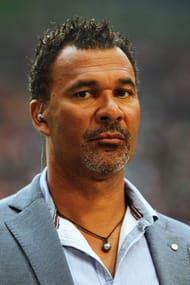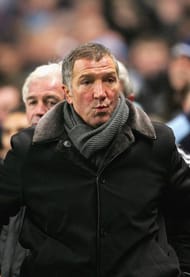The elite status of footballers guarantees them the opulence to indulge in things we can only dream of. Fast cars, beautiful women and gargantuan estates, there nothing more one could ask for in this life. When they are on the wrong side of 30, footballers hit a limbo – continue with football as a profession or diverge into other industries? Many become household names after taking up club management while a lot more fail, rather miserably. Here is a look at few players who shouldn’t have tested the waters of club management.
Honorable mentions: Ciro Ferrara, Paul Ince, John Barnes, Alan Shearer and Hristo Stoickov
Consolation – Bryan Robson
Not only was Bryan Robson the longest serving captain in Manchester United’s history, he also wore the celebrated number 7 shirt. He began his career at a less renowned West Bromwich Albion before moving to the Red Devils for a then British record fee of 1.5 million pounds. At United, he successfully led the club to two league titles, three FA Cups and a solitary League Cup. Before his retirement as a player-coach at Middlesborough, he earned 90 caps as an English player. Often documented for his fierce determination, pace and leadership, the former Red Devil was described by the late Sir Bobby Robson as one of the best players he has worked with.
Robson’s stint as a manager wasn’t as glorified as his playing days. His spell at ‘Boro saw him attract stars such as Juninho, Emerson, Ravenelli and Branco, where they reached the finals of both domestic Cups. However, his mismanagement cost the club dearly as they were relegated in the ‘96-‘97 season. In spite of the club’s revival and eventual promotion to the domestic league, Robson’s days were numbered as he fell out with the players and the board. After leaving Boro’, Bryan Robson managed Bradford, West Brom and Sheffield. Presently, he is the manager of the Thailand National Team.
5. Marco Van Basten
MARSEILLE, FRANCE – MARCH 12: Marco van Basten, coach of Ajax during the Uefa Cup last sixteen first leg match between Olympique Marseille and Ajax at the Stade Velodrome on March 12, 2009 in Marseille,France. (Photo by Michael Steele/Getty Images)
Perhaps one of the greatest European players of all time, Van Basten won laurels at both domestic and European levels with Ajax and AC Milan. His time with de Godenzonen saw him bag the European Golden Boot in 1986 while at Milan, he won the Capocannoniere twice (Serie A’s top scorer) and three European Cups. His constant battles with injury saw him retire at the age of 27, having won European Footballer of the year a record three times and FIFA World Player of the Year in 1992. Speaking about his retirement at a press conference, Van Basten promised to never turn to management. Had he stuck to his words, Van Basten’s imprint in Dutch folklore would have been quite different.
His first real shot at a managerial role came with the Dutch National Team. A man of strong principles, he dropped regular starters (who he believed were the ‘aged’) such as Patrick Kluivert, Clarence Seedorf and Edgar Davids. Under his guidance, the Dutch confidently qualified for the 2006 World Cup, having gone unbeaten in their qualifiers. Dubbed as one of the pre-tournament favorites, their World Cup campaign ended on a different note for Van Basten and his men. In a dramatic and controversial 1-0 loss to Portugal, the Netherlands were knocked out of the tournament.
Many were calling out for Van Basten’s axe as he made some questionable decisions in the line-up – such as favoring the young Dirk Kuyt over the renowned Ruud Van Nistelrooy. KNVB stuck with Van Basten till Euro 2008, where once again the Dutch eased past the group stages to fall against an inexperienced Russian side. After his contract with the Dutch National Team expired, Van Basten went back to managing his childhood club Ajax. His fortunes as a manager did not change as he left Ajax after single season in charge, in spite of spending millions the club failed to win the league and did not qualify for the Champions League.
4. Ruud Gullit

AMSTERDAM, NETHERLANDS – MAY 02: Former player, Ruud Gullit looks on prior to the Eredivisie match between Ajax Amsterdam and VVV Venlo at Amsterdam Arena on May 2, 2012 in Amsterdam, Netherlands. (Photo by Dean Mouhtaropoulos/Getty Images)
An inspirational figure amongst the minorities of Holland, Gullit was well known for his versatility on the field. Notably, the “Black Tulip” won European Footballer of the Year in 1987. An essential piece of the Dutch trio comprising of Marco Van Basten and Ronald Koemen, Ruud Gullit captained the Netherlands (a.k.a chokers) to their only tournament success in Euro ’88. Along with Van Basten, the Dutchman of Surinamese descent won two European Cups at AC Milan, to add to his tally of three Serie A titles and three Eredivisies in his homeland. He hung up his boots having made 540 appearances in which he scored 216 goals.
As a manager, Gullit was unable to build positive relationships with players and the boardroom during his tenure at Chelsea, Newcastle United, Feyenoord and L.A.Galaxy ending disastrously. The then President of Chelsea, Ken Bates described Gullit as a person he never liked and a manager he never respected. At Tyneside, his fallout with fan favorite Alan Shearer and captain, Robert Lee forced his resignation after five games into the 1999-2000 season while at Feyenoord and Galaxy, his departure was rather eminent after a poor first season in charge.
3. Tony Adams

LONDON – DECEMBER 28: Tony Adams the Portsmouth manager acknowledges the Arsenal fans at the end of the Barclays Premier League match between Arsenal and Portsmouth (Photo by Jamie McDonald/Getty Images)
When one Wikis Tony Adams, his description reads: “Tony Alexander Adams MBE, (born 10 October 1966 in Romford, London), is an English football manager and former player.” Not to be blatant and rude, but Mr. Adams does not deserve the tag of even a mediocre manager. However, in my opinion, he is the greatest player to have donned the Gunner jersey, in which he won four League titles, three FA Cups and two League Cups. Despite his problems with alcohol, Adams remained a motivating talisman on the pitch. His ability and strength to read the game made him a threat from set-pieces while his partnership with Lee Dixon, Nigel Winterburn and Martin Keown was often found to be unbreakable by the opposition. This colossal figure in Arsenal’s history still remains as one of the best English defenders of the modern era, thanks to which he received 66 international caps.
Tony Adams’ days as a manager were a mockery. He took over Wycombe Wanderers and saw them relegated. Having worked under Harry Redknapp (who resigned to accept a position with Tottenham), Adams was promoted to the role of full-time manager in Portsmouth. Here at Fratton Park, Tony Adams was fired after a mere 16 games in charge where the club picked up only 10 points. To make matters worse, he went on an adventure to Azerbaijen to manage an unknown club Gabala FC. Adams resigned on 16 November, 2011, thereby cementing the third place in my list.
2. Graeme Souness

MANCHESTER, UNITED KINGDOM – FEBRUARY 01: Manager Graeme Souness of Newcastle United gestures after the Barclays Premiership match between Manchester City and Newcastle United (Photo by Clive Mason/Getty Images)
The man who governed the midfield of Liverpool’s glory days in the 80’s, Graeme Souness is a Scot well remembered for his temper, committed man-marking and ingenious play-making. Member of the illustrious Reds that won five League titles, three European Cups, four League cups and one Intercontinental Cup, Souness finished as the ninth most popular player in the famous poll: 100 Players who shook the Kop. His success as a captain of the Reds transformed him into a successful player-manager at Rangers – a stint where he won numerous accolades. Unfortunately, his success as a manager was limited.
Brought in to continue Dalglish’s legacy, Souness endured a horrid spell at Liverpool. His poor transfer policies, mistreatment of players and substandard tactics sent the club into one of it’s bleakest spells. Souness’ dubious interview with the Sun (Liverpool’s most hated newspaper for their infamous publication on Hillsborough) sparked further outrage amongst fans who claimed he forget his roots. The Scot’s only consolation during his four year tenure was the 1992 FA Cup victory. His fallout with Anfield’s dearest and struggles to lead the team to any silverware in the League and Europe saw him depart from the hot-seat after an ill-fated spell. After a year of unemployment, Souness met with more failure at Galatasaray, Southampton, Torino, Benfica, Blackburn Rovers and Newcastle United. Had it not been for his triumph at Ibrox and a ‘selfless’ Argentinean, Graeme Souness would have made it to the top of my list.
1. Diego Maradona
If it hadn’t been for a Edson Arantes do Nascimento, Diego Maradona would unanimously be proclaimed as the greatest player to have graced a football pitch. Although his tawdry tactic to deflect the ball into the net with his hand against England in the 1986 World Cup still finds its way into news columns, his second goal in that match deserves a mention as one of the greatest goals to have been scored. A shrewd captain, remarkable dribbler and immaculate striker, Maradona holds the unique distinction of breaking the transfer record fee twice when he first transferred to Barcelona and then, to Napoli. Banned from the game for 15 months in the early 90’s for failing a drug test, Maradona has since then struggled to find his form that once broke defenses with tranquility. In 1999, FIFA announced that Maradona along with Brazilian, Pele would share the honors of FIFA Player of the Century.
Maradona’s celestial status on the pitch as a player saw him bag the coaching job of the Argentinean National Team. A poor string of results barely saw Argentina ensuring qualification for South Africa 2010. In spite of their shaky qualifying run, Maradona and his boys were pre-tournament favorites. However, Germany begged to differ as Argentina was thrashed 4-0 in the quarter-final. Blamed for his over-emphasis on the team’s attack which backfired against Germany, Maradona was fired by AFA after the conclusion of the tournament.
His popularity around the world saw Maradona recently take up a position with Al Wasl (a deal that paid him 4 million pounds a year plus a PRIVATE JET), only to get fired within a year of appointment. His record at the Arab club speaks for itself as he managed the club into an eighth spot within a 12 team league. Diego Armando Maradona Franco might be the greatest player to ever kick a football but by no means he is meant to be a manager.

